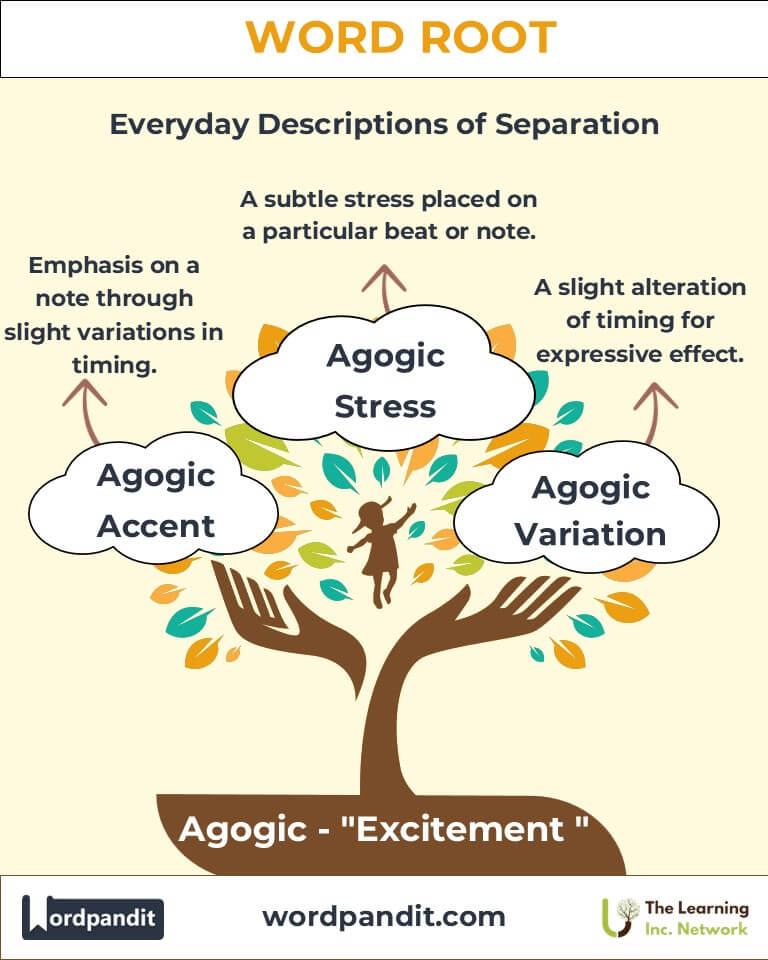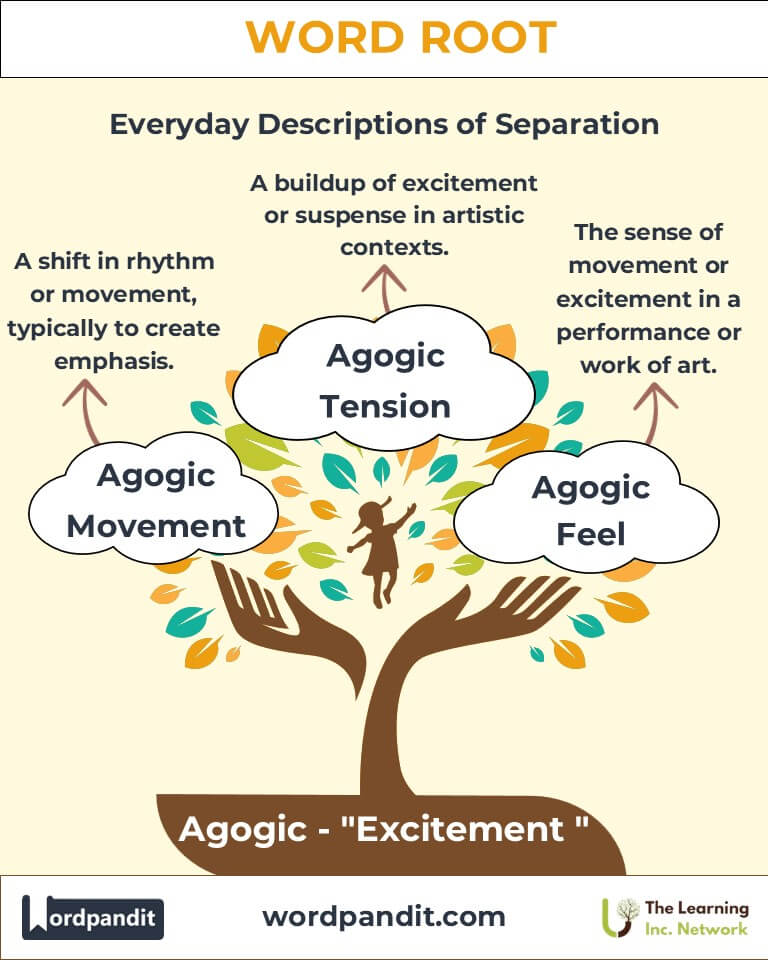Agogic: The Art and Science of Leading Across Disciplines
Discover the root "agogic," derived from the Greek "agogos," meaning "leading." From nurturing guidance in education (pedagogic) to rallying influence in politics (demagogic), this root provides profound insights into leadership and its multifaceted nature.

Table of Contents
- Introduction: The Essence of Agogic
- Etymology and Historical Journey
- Mnemonic: Unlocking the Power of Agogic
- Common Agogic-Related Terms
- Agogic Through Time
- Agogic in Specialized Fields
- Illustrative Story: Agogic in Action
- Cultural Significance of the Agogic Root
- The Agogic Family Tree
- FAQs about the Agogic Word Root
- Test Your Knowledge: Agogic Word Root Quiz
- Conclusion: The Living Legacy of Agogic
1. Introduction: The Essence of Agogic
At the heart of influence lies the root "agogic" (pronounced ah-GOJ-ik), embodying the concept of leading, guiding, or bringing forward. Originating from the Greek word "agogos," meaning "leader" or "guide," this root has enriched vocabulary across diverse fields. Whether through the educational principles of the "pedagogic" or the fervent persuasion of the "demagogic," agogic words capture the dynamic and often transformative essence of leadership.

2. Etymology and Historical Journey
The root "agogic" traces its origins to the Greek "agogos," a term used to describe someone who leads or guides others. In ancient Greece, leadership was pivotal in shaping politics, education, and society. This root permeated Latin as "agogia" and later entered English, adapting to various contexts such as pedagogy (education) and demagogy (mass influence). Over time, it evolved to reflect both noble and controversial facets of leadership.
3. Mnemonic: Unlocking the Power of Agogic
To remember "agogic," imagine a conductor guiding an orchestra with precise movements. The baton represents leadership, directing harmony or dissonance, just as agogic words guide people or ideas.
Mnemonic Device: "Agogic leads the way—whether with wisdom or sway."
4. Common Agogic-Related Terms
- Pedagogic (ped-uh-GOJ-ik): Relating to teaching or education.
Example: "The professor’s pedagogic approach fostered critical thinking." - Demagogic (dem-uh-GOJ-ik): Relating to political leaders who appeal to popular desires and prejudices.
Example: "The politician’s demagogic rhetoric stirred strong emotions among the crowd." - Synagogic (sin-uh-GOJ-ik): Pertaining to gathering or assembly.
Example: "The synagogic practices of the community strengthened their bond." - Mystagogic (mis-tuh-GOJ-ik): Relating to initiation into mysteries or esoteric knowledge.
Example: "The mystagogic rituals introduced the novices to the ancient traditions." - Hypnagogic (hip-nuh-GOJ-ik): Relating to the state of drowsiness preceding sleep.
Example: "She experienced vivid hypnagogic imagery as she drifted off."
5. Agogic Through Time
- Pedagogic: Initially denoting the role of a slave guiding children in ancient Greece, it evolved into a term for teaching principles.
- Demagogic: Once neutral, it shifted to describe leaders exploiting emotional appeals, reflecting changing societal attitudes toward populism.
6. Agogic in Specialized Fields
- Education: Pedagogic emphasizes methods of effective teaching and student guidance.
- Politics: Demagogic highlights the influence of rhetoric and emotional appeal in rallying public support.
- Psychology: Hypnagogic explores the transitional states of consciousness between wakefulness and sleep.
7. Illustrative Story: Agogic in Action
In a bustling classroom, Dr. Lena, a pedagogic expert, nurtured her students' curiosity with thought-provoking questions. Meanwhile, in the city square, a demagogic leader addressed a crowd with fiery rhetoric. These contrasting scenes showcased the dual faces of leadership—one fostering enlightenment, the other wielding influence. Both paths, though divergent, stemmed from the agogic root’s power to lead.
8. Cultural Significance of the Agogic Root
Leadership, as embodied by "agogic," has shaped societies throughout history. From the philosophical pedagogies of Socrates to the fiery speeches of revolutionary demagogues, the root reflects humanity’s enduring quest for guidance and direction.

9. The Agogic Family Tree
- Arch (Greek: "chief, leader"):
- Monarch: A singular leader or ruler.
- Architect: A master planner or designer.
- Duc (Latin: "to lead"):
- Conductor: One who leads an orchestra.
- Introduction: A beginning or leading into a topic.
- Crat (Greek: "power, rule"):
- Democrat: One who advocates for people-led governance.
- Autocrat: A ruler with absolute power.

10. FAQs About " Agogic "
Q: What does "agogic" mean?
A: "Agogic" means "leading" or "guiding," derived from the Greek word "agogos." It emphasizes the act of directing or influencing others, and its influence can be seen across various domains, from teaching to politics.
Q: What is the primary difference between "pedagogic" and "demagogic"?
A: Pedagogic pertains to teaching or educational guidance. It often conveys a positive connotation, emphasizing nurturing and intellectual development. Demagogic refers to leadership that manipulates public emotions, often for personal or political gain. This term typically has a negative undertone, associated with exploiting prejudices or fears to sway opinions.
Q: What does "hypnagogic" mean, and where is it used?
A: "Hypnagogic" describes the transitional state between wakefulness and sleep. It is commonly used in psychology and neuroscience to study dreams, hallucinations, and cognitive processes occurring during this phase.
Q: What does "mystagogic" refer to?
A: "Mystagogic" relates to initiation into mysteries, particularly in religious or esoteric traditions. It often involves introducing someone to sacred knowledge or spiritual practices.
Q: What is the historical context of the term "synagogic"?
A: "Synagogic" is derived from the Greek word "synagogue," meaning "assembly" or "gathering." While originally associated with places of worship, it also applies to organized meetings or collective gatherings for discussion or worship.
11. Test Your Knowledge: " Agogic " Mastery Quiz
1. What does the root "agogic" signify?
2. Which term relates to teaching or educational guidance?
3. What does "demagogic" imply?
4. Which term describes the transitional state between wakefulness and sleep?
5. What is a "mystagogic" activity?
12. Conclusion: The Living Legacy of Agogic
The root "agogic" encapsulates the essence of leadership, whether it nurtures growth in classrooms or ignites fervor in public squares. By understanding its nuances, we appreciate the profound impact of guiding forces across history and culture. Let "agogic" inspire you to lead with wisdom and purpose in all endeavors.














